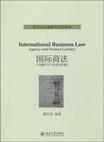国际商法
出版时间:2010-1 出版社:北京大学出版社 作者:顾百忠 页数:217
内容概要
本书《国际商法》(代理法与产品责任法篇)以介绍英美代理法与产品责任法为主,全篇包括两部分共八章。第一部分"代理法"包括:代理法概述、本人和代理人的义务、与第三方有关的合同责任和与第三方有关的侵权责任四章;第二部分"产品责任法"包括:产品责任概述、担保责任、疏忽责任与严格责任制、赔偿与辩护四章。 国际法双语教学教材《国际商法》包括三本,即国际商法“合同销售篇”、“公司与票据法篇”及“代理法与产品责任法篇”。国际商法是法学院国际经济法和民商法专业学生和商学院学生必须要学的一门法律专业课,而外语又是系统学习理解国际商法的必要工具,基于这样的目的,我们编著这套教科书,作为双语教学的试用教材,供法学院和商学院大学英语四级以上的学生以及法律工作者学习理解国际商法和法律英语使用。
书籍目录
PART ONE Agency Law Ⅰ.AGENCY IN GENERAL 1.Formation and capacity 2.Authority 3.Types of agents 4.Employees and independent contractors QUESTIONS FOR EXERCISE CASES FOR SUPPLEMENTARY READING Ⅱ.DUTIES OF PRINCIPAL AND AGENT 1.Agent's duty of loyalty 2.Agent's duty to obey instructions 3.Agent's duty to act with care and skill 4.Agent's duty to notify the principal 5.Agent's duty to account 6.Remedies of the principal 7.Principal's duty to compensate agent 8.Principal's duties of reimbursement and indemnity 9.Remedies of the agent 10.Termination by acts of the parties 11.Termination by operation of law and other situations 12.Termination of agency powers given as security 13.Effect on agent's authority QUESTIONS FOR EXERCISE CASES FOR SUPPLEMENTARY READING Ⅲ.THIRD PARTY RELATED CONTRACT LIABILITY 1.Actual authority 2.Apparent authority 3.Effect of agent's notification and knowledge 4.Incapacity of principal or agent 5.Ratification 6.Subagents 7.Disclosed principal or partially disclosed principal 8.Undisclosed principal or nonexistent principal 9.Liability of agent by agreements 10.Agent's liability on unauthorized contracts QUESTIONS FOR EXERCISE CASES FOR SUPPLEMENTARY READING Ⅳ.THIRD PARTY RELATED TORT LIABILITIES 1.Direct liability 2.Respondeat superior liability 3.Liability for torts of independent contractors 4.Liability for agent's misrepresentations 5.Liability for torts of subagents 6.Agent liability exceptions 7.Suits against principal and agent 8.Criminal liability QUESTIONS FOR EXERCISE CASES FOR SUPPLEMENTARY READINGPART TWO Product Liability Law Ⅰ.PRODUCT LIABILITY IN GENERAL Ⅱ.WARRANTIES 1.Express warranty 2.Implied warranty of merchantability 3.Implied warranty of fitness for a particular purpose 4.Warranty of title 5.Misrepresentation QUESTIONS FOR EXERCISE CASES FOR SUPPLEMENTARY READING Ⅲ.NEGLIGENCE AND STRICT LIABILITY 1.Improper manufacture 2.Improper inspection 3.Failure to warn 4.Design defects 5.Requirements of section 402A 6.Applications of section 402A 7.The Magnuson-Moss Act 8.Section 402B 9.Industry-wide liability QUESTIONS FOR EXERCISE CASES FOR SUPPLEMENTARY READING Ⅳ.DAMAGES AND DEFENSE 1.The types of damages 2.What recoverable 3.UCC section 2-318 4.Implied warranty disclaimers 5.Express warranty, negligence, and 402A disclaimers 6.Limitation of remedies 7.Time limitations 8.The traditional defenses 9.Comparative principles QUESTIONS FOR EXERCISE CASES FOR SUPPLEMENTARY READINGAPPENDIXESRESTATEMENT (THIRD) OF AGENCYRESTATEMENT (THIRD) OF TORTS : PRODUCTS LIABILITYGLOSSARYREFERENCES
章节摘录
Agency is a two-party relationship in which one party (the agent) is authorized to act on behalf of, and under the control of, the other party (the principal). Simple examples of the agency relation include hiring a salesperson to sell goods, retaining an attorney, and engaging a real estate broker to sell a house. Agency laws most important social function is to stimulate business and commercial activity. It does so by allowing people and businesses to increase the transactions that they can complete within a given time. Without agency, business and commercial life would proceed at a very slow pace. A sole proprietors ability to engage in trade, for instance, would be limited by the need to make each contract for purchase or sale in person. As artificial persons, moreover, corporations can act only through their agents. Agency law can be divided into two rough categories. The first involves the legal rules controlling relations between the principal and the agent. These include the rules governing formation of the agency relation, the duties the principal and the agent owe each other, and the ways that an agency can be terminated. Such topics are the main concern of this chapter. The second involves the legal rules controlling the principals and the agents relations with the third parties. In this chapter, our main concerns are the principals and the agents liability on contracts made by the agent and on torts committed by the agent. 1. Formation and capacity. An agency is created by the manifested agreement of two persons that one person (the agent) shall act for the benefit of the other (the principal) under the principals direction. As the term manifested suggests, the test for the existence of an agency is objective. If the parties behavior and the surrounding facts and circumstances indicate an agreement that one person is to act for the benefit and under the control of another, courts hold that the relationship exists.
图书封面
评论、评分、阅读与下载
用户评论 (总计0条)
相关图书
- 高频电子线路
- 三国演义诗词鉴赏
- 中国电视娱乐节目形态学
- 不景气也能找到好工作
- 最受欢迎的名家哲理美文排行榜
- 最受欢迎的名家动物小说排行榜
- 最受欢迎的名家亲情美文排行榜
- 最受欢迎的名家精彩故事排行榜
- 家用汽车电器释疑举要
- 中国科普统计2009年版
- 英语教师用书1
- 多样与互动
- 持续贸易顺差背景下的中国货币政策选择
- 收入不均等对人力资本的影响研究
- 《2010年会计专业技术资格考试课堂笔记及典型例题精析》中级经济法
- 2009年
- 企业微观效率基础的理论研究
- 《2010年会计专业技术资格考试课堂笔记及典型例题精析》中级会计实务
- 【年末清仓】《2010年会计专业技术资格考试课堂笔记及典型例题精析》中级财务管理
- 中国对外贸易结构新论
- 从一元到二元
- 一读就懂的心理学
- 狼道全集
- 生活中的经济学
- 20几岁要学会为人处世
